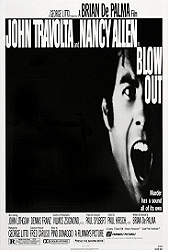De Palma pours the sum total of his talents into what is now viewed by many to be his magnum opus, "Blow Out". John Travolta (in a career-best turn) impeccably portrays a movie soundman and surveillance expert who inadvertently records the assassination of a Presidential hopeful. Operating as an instigating progressive for the narrative, the electrifying murder itself, dissected and rewound within the film, boldly unveils the complex, mysterious, illusory and seductive power of filmmaking as the obsessive, fanatical process that it truly is.
By way of exploring a vast litany of themes including paranoia, voyeurism and technology, De Palma realises his most downbeat, loaded homage to Hitchcock, and yet, whilst derivative of American cinema of the 1950s and 1970s, "Blow Out" also references British cinema of the 1960s, particularly its namesake, Antonioni's art film "Blow-Up". Exposing the machinations of filmmaking and politics with reverberating narrative depth, "Blow Out" employs intricate, nuanced layering through a cynical, conspiratorial and carnal prism, meaning that De Palma's tendency to veer towards style over substance with his work does not apply here; his cinematic pathology, psychology and choreography converge flawlessly, achieving thematic resonance by navigating his fantasy world (divided personalities, porno set pieces, technical gimmickry, split-screens opening up a self-contained world and new perspectives of situations, movies-within-movies, socially relevant characters at cross purposes, variable identities, sensibilities and worldviews that match his own) whilst acknowledging stark, blunt-edged reality through gymnastic camera work, black-comic dialogue and emotion-laden imagery.
Coded, stunning photography, dense plot and suspenseful set pieces are all harnessed by De Palma to expound his trademark audacious perfectionism, sinister elegance and stylistic flair, but "Blow Out" crystallises its pop culture allusions in baroque, fluid form, sustaining alacritous momentum before adopting an unhinged pace at its heart-stopping climax and profoundly tragic end executed with precision detail. Scathing in its dissection of the very landscape it celebrates, the tonally sardonic examination of corruption and dissent within government pervades through every aspect of the film, which is generally unrelenting in its multi-faceted, voluptuousness, however, with more political overtones than sexual, De Palma is able to earnestly explore crime and horror through a new darkly poetic lens. "Blow Out" is a personal culmination of recurring ideas, themes and styles imbued with poignancy and ripened artistry that evokes all of De Palma's dynamic yet flawed previous work and expertly supersedes it, crafting a capacious, virtuoso aesthetic experience that will render you at once unequivocally destabilised, mesmerised and emotionally destroyed.
 Login
Login